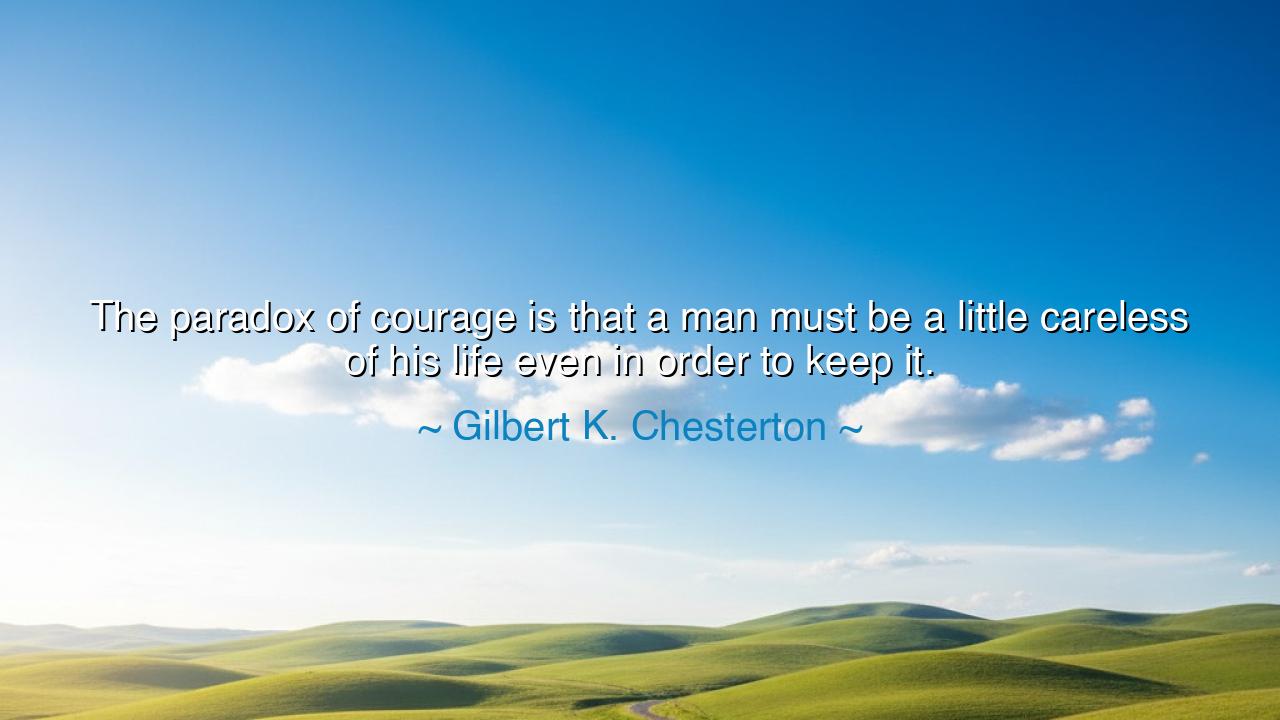
The paradox of courage is that a man must be a little careless of
The paradox of courage is that a man must be a little careless of his life even in order to keep it.






“The paradox of courage is that a man must be a little careless of his life even in order to keep it.” – Gilbert K. Chesterton
In this immortal saying, Gilbert Keith Chesterton, that philosopher of paradox and defender of truth, speaks to the mystery at the heart of all courage. He reminds us that life, though precious, cannot be preserved by fear. To cling too tightly to one’s safety is to lose the very vitality that makes life worth living. The paradox of courage, he says, is that in order to truly live — in order to protect life, meaning, and dignity — one must be willing to risk all three. The man who fears death too greatly becomes a slave to survival; the one who dares to act despite that fear becomes truly alive. Chesterton’s words pierce through the illusions of comfort, calling us back to the ancient truth that life is sustained not by caution, but by conviction.
The origin of this insight lies both in Chesterton’s mind and in the history of mankind. He lived in an age of uncertainty — the early 20th century, when war, industrial might, and moral doubt clashed like storm and thunder. He saw how modern man, cushioned by progress, had begun to value safety above honor, and existence above meaning. Yet Chesterton, ever the champion of paradox, recognized that to live only for self-preservation is to live in fear, and fear is the slowest form of death. Courage, he wrote, is not recklessness, nor the absence of fear, but the decision to act rightly even when the cost is dear. To “be careless of one’s life” is not to despise it, but to hold it in the open hand of faith — to use it boldly, instead of hoarding it timidly.
The ancients understood this truth with their blood and bones. The Spartans at Thermopylae stood as a living embodiment of Chesterton’s paradox. Facing the vast armies of Persia, they knew that their stand would almost certainly mean death. Yet it was precisely their willingness to lose their lives that preserved their nation’s spirit and inspired freedom for centuries to come. They did not fight because they wished to die, but because they loved something more than life — their homeland, their honor, their duty. And so, by being “a little careless” of their lives, they found immortality in the memory of mankind.
Chesterton’s paradox reaches deeper still, for it applies not only to warriors, but to all who would live nobly. Consider Martin Luther King Jr., who walked the streets of injustice knowing full well that death waited in every shadow. He did not seek martyrdom, yet neither did he flee it. His courage was born of a love greater than fear — a love for justice, for truth, for his fellow man. And when he fell, the very life he risked became the seed of freedom for millions. He, too, proved Chesterton’s truth: that life, when grasped too tightly, decays; when given freely, it flourishes.
This paradox lies also within the human heart. The man who is too afraid to love will never know love’s joy. The one who fears failure will never taste success. To live is to risk loss, and only by embracing that risk can one find meaning. The bird that refuses to fly for fear of falling dies upon the ground; the heart that refuses to dream dies within the cage of caution. Thus, to be “a little careless” of one’s life is not to act without thought, but to trust that life is best preserved through the act of living — through courage, faith, and the willingness to face the unknown.
In this way, Chesterton’s wisdom becomes not merely a reflection on heroism, but a philosophy of existence itself. The universe, he teaches, was not built for the timid. Every creation, every discovery, every act of love and defiance springs from those who dared to let go — who risked safety for greatness, peace for truth, comfort for conscience. To be human is to stand upon the edge of uncertainty and step forward anyway. The flame of life burns brightest in those who are unafraid to let it flicker in the wind.
So, my children, take this teaching into your hearts: do not seek to guard your life as though it were gold hidden in a chest. Life is not meant to be stored, but to be spent — spent in purpose, in courage, in the service of something beyond yourself. Do not fear risk, nor hardship, nor sacrifice, for these are the forge of the soul. If you would truly live, learn to hold your days lightly, and your duty firmly. In moments of fear, remember Chesterton’s wisdom: only those who are willing to lose their lives truly save them.
For the man who risks nothing may live long — but he will not live deep. Yet the one who dares, who faces the storm with courage and faith, becomes like the oak that stands unmoved amid the thunder: scarred, perhaps, but eternal. Thus, embrace the paradox, and live not in fear of death, but in pursuit of truth, love, and purpose — for these are the fires that make the human spirit deathless.






AAdministratorAdministrator
Welcome, honored guests. Please leave a comment, we will respond soon